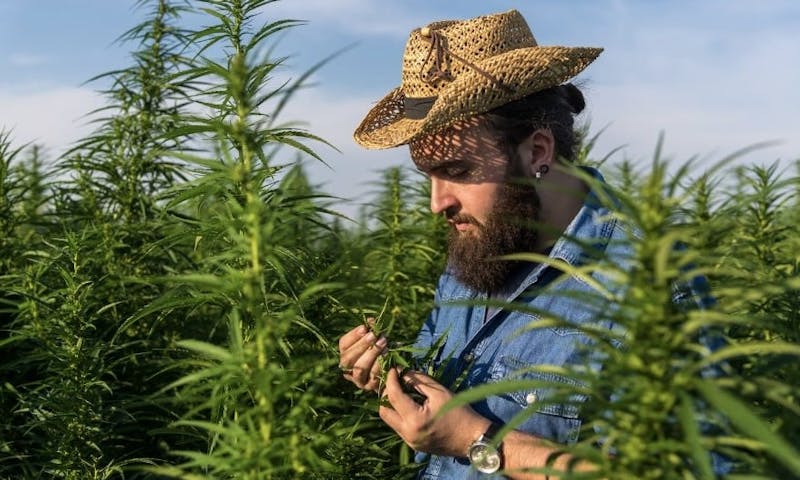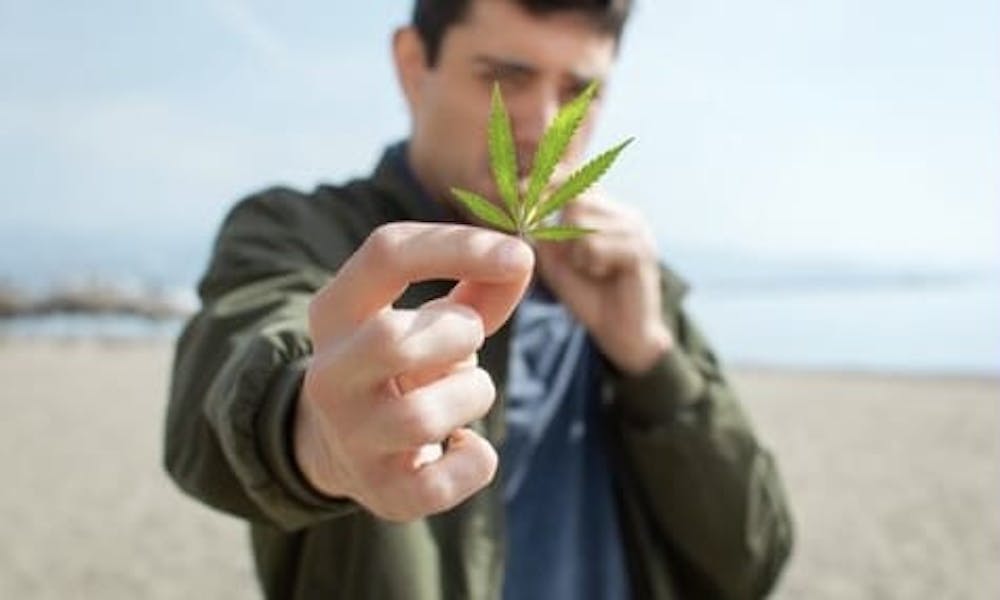
At first glance, it may seem odd to put marijuana and gynecomastia in the same sentence. What could they have in common?
However, as it turns out, the two may be linked. In this article, we’ll take a closer look at this and also discuss the most common proven causes of gynecomastia in men.
Marijuana Use and Gynecomastia
The relationship between gynecomastia and marijuana is one that has been anecdotally observed more than once. That is, both regular people who use marijuana (and related cannabis drugs) and medical professionals and researchers have noticed the link: Marijuana use is not infrequently associated with gynecomastia.
That being said, the science isn’t exactly clear. There are some studies that have shown no link between the two. Some have even claimed that anti-drug bias has snuck into the research and spread the idea of an association between gynecomastia and marijuana use much like a vicious rumor.
Some of those in support of the link say that the use of marijuana may cause hyperprolactinemia, which is an overproduction of the hormone prolactin. For women, prolactin is the hormone that stimulates milk production during and after pregnancy.
If a man were to have the condition hyperprolactinemia due to smoking marijuana and gynecomastia presented as a result, the association would be clear.

Other studies have found that marijuana induced gynecomastia is caused by reduced testosterone production. They claim that using marijuana causes male testosterone levels to plummet, which results in a hormonal imbalance and gynecomastia. It has also been noted that marijuana can be an estrogen stimulator which could also cause the imbalance.
Perhaps it will take more research and time to know for sure whether cannabis smoking and gynecomastia are linked. Still, we do know a lot about what can certainly lead to gynecomastia in men. Below, we’ll explore these gynecomastia causes.
What Is Gynecomastia?
Generally speaking, having enlarged male breasts is known as having gynecomastia. With that said, most gynecomastia surgeons don’t really differentiate between “true gynecomastia” and “pseudo gynecomastia”.
“True gynecomastia” is typically known as gynecomastia that has been linked to varying estrogenic and androgenic effects (hormonal imbalances). The result is mostly excess breast tissue (glandular tissue), much as would be found in a woman’s breasts.
“Pseudo gynecomastia” is basically enlarged male breasts that are caused by other issues. For example, if a man has “man boobs” because of genetics, excess overall body weight, or fat skin on his chest, this may be deemed “pseudo gynecomastia”.
You can see a plastic surgeon for gynecomastia treatment in either one of these situations. Whether you have actual breast tissue growth, excess fatty tissue only, loose skin, or a combination of these, treating gynecomastia almost always comes down to gynecomastia surgery (as long as any underlying causes are also taken care of).
What Can Cause Breast Enlargement in Men?
As stated above, there are varying reasons why gynecomastia may occur in male patients. Let’s go over a few of the most common causes below:
Certain Medications & Drugs
Certain drug use — whether for medical or recreational purposes — has been solidly linked to gynecomastia. Smoking weed is one example, but again, this has not been definitively proven. The same goes for other related drugs in the marijuana group.
Other drugs linked to gynecomastia include anabolic steroids, drugs used to treat conditions such as testicular cancer, alcohol, and heroin.
Certain Medical Conditions
Some serious medical conditions such as cirrhosis of the liver, pituitary gland cancer, testicular cancer, lung cancer, liver cancer, thyroid issues, and other diseases can be related to gynecomastia. In some cases, the drugs used to treat these issues are also linked.
If you know you have (or suspect you may have) one of these conditions, it’s important to treat the underlying cause before seeking gynecomastia surgery.
This is not only for your overall health, but also because if the underlying condition isn’t treated, it is possible your gynecomastia may return after surgery.
Weight Gain
Weight gain overall can often cause excess fat to accumulate around the chest. Where fatty tissue develops in a man is usually linked to genetics. Certain men are predisposed to develop more fat around the breast area. Chest liposuction is often the go-to treatment in these cases.
Sometimes, if a man gains then loses a large enough amount of weight, the skin also stretches but does not “bounce back” after weight loss, and this can mean excess breast skin that must be removed with surgery as well.
Natural Hormonal Changes
At certain points in life, males may have hormonal fluctuations that cause excess breast tissue to form. In fact, newborns often have “breast buds” due to the excess estrogen in their systems from their moms.
At and right before puberty, males frequently experience excessively large breasts. Usually, the condition goes away on its own, but sometimes, surgery is required. Finally, later in life, men may have the same experience due to hormonal changes.
How Is Gynecomastia Surgery Performed?
This depends on the patient’s situation. Some men may simply require a small incision made around the areola to remove the excess fat and/or glandular tissue while others may need a skin excision to remove sagging breast skin as well as tissue and fat. Your procedure will be assessed at your consultation appointment.
FAQ: Male Breast Reduction Surgery
What drug causes gynecomastia in men?
Various drugs can cause gynecomastia in men. Marijuana may be linked to the condition, and other drugs such as anabolic steroids, alcohol, cancer treatment drugs, and more may also be associated with the production of excess glandular tissue.
Can drug induced gynecomastia be reversed?
This depends on the situation. Often, if men stop taking the drug that induced gynecomastia, the condition will improve. Other times, the damage is done; however, with gynecomastia treatment, the excess breast tissue can be removed and will not come back. We will help you determine the best way to approach your gynecomastia at your consultation appointment.
Learn More at Your Consultation Appointment
Drug induced gynecomastia can lead many patients to have loads of questions about their condition and treatment. While you may end up requiring additional testing and assistance from other medical professionals depending on your situation, we can certainly help you learn more about the condition of gynecomastia and how it can be effectively treated at your consultation appointment.
To find out more about gynecomastia and gynecomastia surgery, please contact our practice today and schedule your one on one consultation appointment with board certified plastic surgeon Dr. Charles Galanis.
References
https://www.amjmed.com/article/S0002-9343(06)00162-8/fulltext


